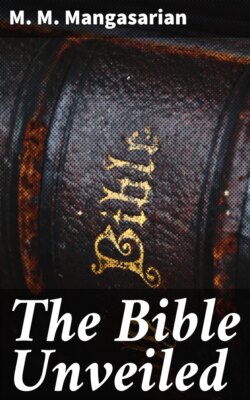Читать книгу The Bible Unveiled - M. M. Mangasarian - Страница 11
На сайте Литреса книга снята с продажи.
Catholics Make Their Own Bible
ОглавлениеTable of Contents
ONE of the significant facts about the bible is that no two copies of it are exactly alike. There are nearly as many versions of it as there are sects. The most important variations are to be found between Catholic and Protestant bibles. As I write I have before me a copy of the Catholic "Holy Bible," on the title-page of which are these words:
HOLY BIBLE.
Translated from the Latin Vulgate.
This edition of the Holy Catholic Bible, having been duly
examined, is hereby approved of.
Then follows a long list of the names of bishops and archbishops. It is thus intimated that no bible is the "Word of God" unless it has the endorsement of these Catholic dignitaries. Only after these men have examined the bible and given it their sanction does the book become "divine." No layman can tell for himself, unaided by a priest, the "Word of God" from the word of man. In fact, it is the priest who changes the word of man into the "Word of God" by the same process that he converts ordinary bread into a God.
There is given also in the "Holy Catholic Bible," before me, a list of the books which are pronounced to be "inspired" by the Council of Trent. To introduce into the bible any book not contained in this list, or to exclude from the bible any one of the books which the Council of Trent has decided to be "inspired," is to be guilty of blasphemy. This is what it says:
Now if any one reading over these books in all their parts, as they are usually read in the Catholic Church... does not hold them sacred and canonical... and does industriously contemn them let him be anathema.
To be anathema means to be accursed. In other words, there is no choice; it is the Catholic bible or a curse. No man has any right to choose for himself, or decide according to his own conscience and knowledge, which is the "Word of God," or how much in the various bibles is actually "the Word of God." He must, then, choose between the priest's bible or—his curse. To try to prove a book "inspired" by threatening to curse all those who may tell the truth about it, is a sure sign that the makers of the bible themselves do not believe in its inspiration. It is impossible to think that if the priests really believed the bible to be "divine," they would have undertaken to hedge it about with anathemas. But they curse to conceal their own unbelief. There is not another book that had to curse its readers to make them believe in it.
The most effective argument against the bible is furnished by the church itself. For nearly fifteen hundred years it hanged and burned people alive to make them believe in the bible. That is a good way to prove one's unbelief, not one's faith. It shows what little confidence the Catholics had in the ability of "the Word of God" to defend itself against a Giordano Bruno, when they burned him at the stake; and how dubious the Protestants were of their bible, when they burned Michael Servetus at the stake. The long list of terrible crimes committed in defense of the bible is a conclusive proof, first, of the unbelief of the Christians themselves in the ability of the bible to win men by the beauty and truth of its teachings; and, second, of the evil influence of the book upon those who accepted its authority.
The preface to the Catholic bible offers a further proof of the lack of confidence of Christians in "the Word of God." It forbids people, as already shown, to read the Word of God without first securing the consent of a priest. It is a heinous thing, according to the church authorities, to undertake to read the bible on one's own responsibility. "To prevent and remedy this abuse" (namely, that of reading the bible, and interpreting it for one's self), says this same preface, "it was judged necessary to forbid the reading of the scriptures in the vulgar tongues." Of course, ''there is no prohibition against reading it in Latin, or Hebrew, or Greek, or in any language that one does not understand, but it is forbidden to read it in the vulgar, that is to say, in any language that the reader is familiar with, "without the advice and permission of the pastors and spiritual guides whom God has appointed to govern his church." To prove this authority of the priest to forbid the reading of the bible, the following text is quoted: "He that will not hear the church, let him be to thee as the heathen and the publican." *
